#we love a sequence where pan changes form three times on screen. even when its emo
Explore tagged Tumblr posts
Text








Is this the Land of the Dead? Just tell us where you're going. It's like they're being pulled forward by something.
HIS DARK MATERIALS 3.04 | Lyra and Her Death
#hdmedit#his dark materials#hdm#hisdarkmaterialsedit#lyra silvertongue#pantalaimon#will parry#dafne keen#hdmsource#userzhr#userplatinum#userpegs#usernik#userjjessi#*cajedit#*gif#we love a sequence where pan changes form three times on screen. even when its emo#we also all hate the lighting and coloring of the land of the dead sequences and having to fix it#altho i will admit it does hit when youre watching#it's so sickly it's fitting
81 notes
·
View notes
Text
FOP: Fairy Fallout Pt.1
Act I
“The Fairly OddParents: Fairy Fallout” begins where another one of Timmy’s unintentionally catastrophic wishes has ended. The opening of the episode starts with a shot of Timmy’s room where Timmy, Cosmo, and Wanda are poofed into the scene looking utterly relieved to see that everything was back to normal after narrowly preventing an irreversible disaster. The main trio took a moment to reflect on their most recent misadventure, mainly with Cosmo and Timmy going about it with a positive attitude while Wanda balanced out their more comedic commentary with a lecture on how they really needed to be more careful next time; only for it to be brushed off by both her husband, and godchild. While Timmy actually did acknowledge the lesson to be learned, he questioned the odds of future consequences since he always corrected his mistakes in the end.
“It’s not like I’m going to lose you guys because of this, right?” Timmy asked jokingly with a shrug.
Before either of the fairies could respond, however, the hulking form of Jorgen Von Strangle suddenly appeared in an explosion of fairy dust right behind the ten-year-old; the realization of Jorgen’s presence was enough to wipe the smile off of Timmy’s face the moment his smaller form became shrouded in Jorgen’s massive shadow. The camera then panned up to capture Jorgen’s expression of absolute fury, wafts of steam rose up into the air from off of his shoulders and out of his ears while his generally bronzed skin was colored a fiery red hue.
“Timmy Turner, this is the last time I let you get away with nearly causing the end of the Earth, and the entire universe!” He bellowed in a rage, shouting loud enough to send both Timmy and his fairies flying back into the bedroom wall with a loud thud before bringing his wand up to conjure a projection screen.
One by one, Jorgen Von Strangle brought up footage of Timmy’s past shenanigans that turned dangerous. From time-travelling to role-reversal, and wishing for the entire world as everyone knew it to change at the drop of a hat, Timmy and the others sat in silence as Jorgen went on with his lecture. By the end of the slideshow, Timmy tried to object to Jorgen’s accusations, but he was immediately cut off by the hulking fairy. Not even Cosmo and Wanda were able to make an effort to persuade Jorgen into giving Timmy another chance to prove himself this time, which only brought a more intense amount of dread over the three of them. After brutally berating Timmy and his fairy godparents, Jorgen’s skin began to fade back into its usual tanned color, and his expression deadpanned.
With another blink of his wand, he conjured up the “Da Rules” book before opening it to a section to describe the punishment for godchildren who never learn from their mistakes time and time again. Unfortunately, having grown used to Jorgen’s usual lectures, Timmy only stared up at Von Strangle with a somewhat distant look on his face. In Timmy’s perspective, he could only hear mumbling and incoherent babbling from Jorgen, with the exception of certain words being registered more clearly until the conclusion of the massive fairy’s speech.
“From now on, you no longer have to share your fairy godparents with Chloe-” Jorgen declared, pausing for a moment once Timmy smiled joyfully at the declaration, but then finished his statement with a sadistic smirk on his face. “Because you don’t get to have fairy godparents anymore!”
Timmy’s expression of glee turned to a look of astonishment, and disbelief in an instant, along with Cosmo and Wanda reacting just as horrified by the decided punishment. While the three of them had close calls where Timmy would end up on the verge of losing his fairy godparents forever at certain points, there would always be a way to turn it all around in order to keep them from separating. The stakes would be high, but there would still be a way that gave Timmy a chance to take control of the situation. However, this was no longer the case.
Cosmo and Wanda pleaded with the superior fairy to let them keep Timmy as their godchild, begging for Jorgen to show some consideration for all the years they spent making Timmy’s life more manageable, and to remember how far Timmy would go to right his wrong-doings. Timmy was driven to tears as his shrill voice argued with Jorgen’s verdict, his high-pitched tone just about wailing in a mix of despair, anger, and desperation from having Cosmo and Wanda being taken away from him. They weren’t just playthings to him, nor were they just his fairy godparents. They were his family. Even with the overwhelming grief surrounding the whole scene, Jorgen Von Strangle remained emotionless, and unmoved by their efforts to appeal to him.
Realizing that there was no changing Jorgen’s mind, Cosmo and Wanda sorrowfully hugged their godchild goodbye. Wanda barely managed to say some comforting words to try and assure Timmy that they would always love him, but even that did nothing to ease the unbridled heartache all three were experiencing. Jorgen Von Strangle merely rolled his eyes at the display, watching impatiently as the fairy couple mutually clung to Timmy until he roughly grabbed Cosmo and Wanda in his gigantic hand to tear them away from Timmy’s hold. With a single strike of Jorgen’s staff-like wand on the hardwood floors of Timmy’s bedroom, and one last flash of the wand’s star, the fairies disappeared in another cloud of fairy dust that eventually faded into nothing. Timmy Turner was left all alone, sobbing with no one to console him, as the sequence ended.
The next shot was set in Chloe’s room after Jorgen brought Cosmo, and Wanda over to tell her everything that she needed to know. This included explaining why Timmy would no longer have custody over the fairy couple, and giving Chloe a stern warning on the more major responsibility of being the only godchild to Cosmo and Wanda. Chloe could only stand, and stare up in disbelief as she took in all of the troubling information. Unlike his cruel demeanor towards Timmy, Jorgen spoke in an uncharacteristically warm manner towards Chloe, even if she had her fair share of mishaps caused by her own wishes during the time she’d been a secondary godchild; Jorgen still had a bit of a soft spot for Chloe. He genuinely sounded excited to finally have Timmy out of his hair, making off-handed comments about how he was glad to know that someone as reliable and responsible as Chloe wouldn’t cause nearly as much trouble as Timmy ever did, even though he would normally take fairies away from both godchildren if only one of them broke any of the major rules.
After a moment of letting Jorgen ramble, Chloe finally interjected in her usual polite tone, asking if it was truly the right thing to do. At this question, the gargantuan fairy blinked with a look of bewilderment on his face. No doubt, he had been expecting excitement, or glee from Chloe when he told her that Cosmo and Wanda were officially all hers. Picking up on Jorgen’s questioning gaze, Chloe continued to put in her take on whether or not it was right to deprive Timmy of his fairy godparents, emphasizing that Timmy actually lived quite a miserable life without them. She even went so far as to point out the words stated in “Da Rules” about the importance of fairies being assigned to children who were miserable, but to no avail. Even though Jorgen had a sense of fondness towards Chloe, her words fell on deaf ears, and Jorgen was quick to counter her argument.
“Would you rather risk the whole world, and the entire existence of life as we know it coming to an end because of the reckless actions of a single child?” Jorgen questioned, conjuring up a bar graph that depicted potential rates of apocalyptic destruction lowering dramatically in accordance with Timmy no longer having Cosmo and Wanda to grant his thoughtless, and sometimes selfish, wishes.
Chloe’s shoulders tensed up as she pondered Jorgen’s retort, and took in all of the evidence Jorgen Von Strangle presented to her. Inside her mind, Chloe truly did want to help the world in any way she could. That’s what she was raised to do, and what just about everyone expected from her. Without Timmy’s spontaneous and risky wishes to potentially shake up the entire universe, the dream of making the world a better place was within her reach.
“But, what about Timmy?” She asked, sending a concerned glance out of her bedroom window to peer over at Timmy’s house.
Once again, Jorgen brushed off Chloe’s concern for her friend, bluntly stating that it didn’t matter anymore before abruptly teleporting out of the room. Everything fell silent now that Jorgen was gone, all except for the light sobs of Cosmo and Wanda as they floated a few feet away from Chloe, crying over a framed picture of Timmy that they held in their hands. As the fairy couple were grieving, Chloe quietly approached them, and gave the two a reassuring grin while opening her arms to welcome them into a comforting hug. But as the scene came to a close, Chloe’s soft expression turned into a look of serious determination as if the sorrows of Cosmo and Wanda ignited a spark of inspiration within her. Even though she felt a sense of uncertainty deep down, Chloe knew that there just had to be a way to help her neighbor somehow, and she was going to find a solution.
#[FOP: Fairy Fallout]#fairly oddparents#timmy turner#chloe karmichael#cosmo and wanda#jorgen von strangle#creepypasta
5 notes
·
View notes
Text
The Magicians Page vs Screen
I recently finished the audio book version of Lev Grossman’s The Magicians trilogy while anticipating the third season of SyFy’s adaptation. I have some thoughts to share, in no particular order.
I should first mention that, in addition to having watched the first two seasons of the TV show, my expectations of the books were colored by reading some reviews, in particular that Emily VanDerWerff whose interpretation of changing perspectives of the narrator’s focus representing growing up and becoming more aware is true in the abstract, but also kind of misleading. The books increase the number of perspectives, but they are still primarily that of Quentin Coldwater. I was under the impression that every chapter in The Magician King would alternate between Quentin and Julia, but it was really more like three chapters from Quentin’s perspective for every one from Julia’s. (I’m going to struggle with my thoughts about Julia’s changing narrative status from page to screen. In general I think the TV show improves things for her. Nothing in the books is as pleasing as her friendship with Kady, she gets her shade back and in general having more time for her point of view is an improvement.) Also in her review she states that the books have very little plot, but that’s only true of the first book in the trilogy. The subsequent ones are tightly paced thrillers.
Around the first season and (not accidentally) the release of Star Wars: The Force Awakens, Vox also published an article about the annoying cliche in sci-if and fantasy fiction in which a male protagonist is helped by a more talented female character who is never allowed to be the protagonist. I tweeted the article and a fan got defensive about how the Quentin/Alice relationship doesn’t fall into the same pattern as that of Luke/Leia, Neo/Trinity, or Harry/Hermione. At the time, I admitted that I had yet to watch or read the full series, but agreed with the larger thesis. This did not assauge the person in my Mentions, but now I want to say, Quentin/Alice is a much stranger, more fraught relationship than the others are allowed to be. (And I love it.)
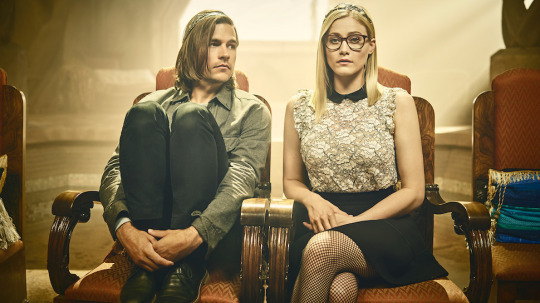
Also, one thing that appealed to me about the show, is that I caught the start of the second episode after an episode of Lost Girl. It starts with a sequence set to “Intro” by The XX’s from their first album. I had owned the album for years but could never get into it until I saw this sequence. I really like it when one art form brings another to life like this.
Using the audio book version makes the experience time-conscious in a way that reading silently does not. This really struck me with regards to the difference between book and TV Fillory. In the books the clock trees are a very prominent part of Fillory in a way they aren’t in the TV show. TV, as a medium, is already self conscious of time, which made me wonder if the clock trees are a tool to make the reader think of time, which would be redundant in TV. (This is broadcast TV, streaming TV, with it’s less tight running times is an exception, perhaps to its detriment.)
The TV show gave me a sense that the Fillory and Further series-within-the-series was basically The Magicians’s version of Narnia. So I was surprised that in the books we get so much more detail about the plot of the series-within-the-series and resembles a cross between Narnia and Oz. The backstory of the writing also reflects this. I think that in the TV show, the Chatwin kids are in the country due to Operation Peter Pan in World War Two, just as in The Lion the Witch and the Wardrobe. But in the Books, it’s World War One and the kids are in the country because their father is in the war and their mother is indisposed. Between the time change and having the novels within the novel’s author, Christopher Plover be an American expatriate in the English countryside the books feel like they are explicitly placing Fillory as a midpoint between Oz and Narnia.

Incidentally, the name Christopher Plover is reminiscent of Winnie the Pooh’s Christopher Robin who reportedly felt miserable and exploited by his father’s writings. TV series Plover is English and played by Charles Shaughnessy of The Nanny fame, which feels like calculated way of enhancing the affect of his abuse of Martin Chatwin.
The TV series Fillory may lose some of the direct links to Oz, but its attitude about growing up is closer to Oz than Narnia.
There was a lot of criticism about how the TV show’s pilot was overstuffed and muddled, so I was surprised that so much of the information that had to be communicated in the pilot is exposed early in the first book.
On the other hand, The Beast’s first appearance and Alice’s backstory with her brother are brought up much faster in the TV show. In the case of Alice, her story definitely has more impact and pathos in the way it’s brought up in the book, so that’s a loss on TV. But I do really like bringing the threat of the Beast up so quickly.
One of the most surprising differences between the Books and TV series is that in the Books, the first trip to Fillory is made just because they can (and because they need something to shake themselves out of their post-graduation lethargy). On the TV show it’s because the Beast is regularly threatening them. TV really isn’t a great medium for portraying lethargy, it isn’t intimate in the way reading is. Quentin isn’t sympathetic in the events leading up to the trip to Fillory in the books, but you’re in his head, so you’re with him. Then the key act of Quentin cheating on Alice in a threesome with Eliot and Janet/Margot comes off very differently in the two media. In the Books it’s a personal nadir and a major betrayal. It’s compounded by the fact that Quentin was thinking about Janet while feeling frustrated with Alice. On the Show, it mostly feels like a case of bad timing rather than a personal choice. They had literally bottled up their feelings to practice Battle Magic, when they retrieved the feelings back they’re confused and stronger. They also self medicate. As group falling into bed feels inevitable and it’s just bad luck that Alice isn’t there to be a part of it.
Both Book and TV versions of Quentin are more emotionally attached to Eliot than to Janet/Margot. After the threesome, Book Quentin obsesses over how stupid he was to betray Alice with Janet, but he can barely acknowledge that he was also with Eliot. In the TV fandom, there is a lot more focus on the Quentin/Eliot coupling than on the Quentin/Margot one. The schism reminds me of Crime and Punishment (of all things) where Raskolnikov obsesses over one of his victims, and the detective focuses on the other. Considering that a major theme of The Magicians is crossing over from fan to participant/creator, it feels appropriate that fandom would be part of a literary parallel (and impossible to plan.)
TV Margot is much more of a character than Book Janet, but we don’t yet know if they share backstory or if that’s as different as their names. Show and Book Penny also have little besides a name in common, Kady and Asmadeus have even less.
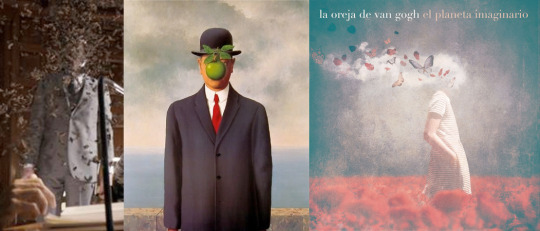
The Beast’s design on the show kind of reminds me of the cover of La Oreja de Van Gogh’s “El planeta imaginario”. Seeing it this way kind of undercut how unnerving he could be, and made the album cover scarier than I think was intended. I was surprised that the Book’s description is so different, just a man with a tree branch in front of his face. I get why they’d want to redesign that for the camera, but I like how René Magritte-like that description is.
Finding out that the Beast is Martin Chatwin is such a great twist that I wished I could be shocked by it when I experienced it in another medium. (I’m having kind of the opposite experience with Game of Thrones, I’m not eagerly anticipating those twists.) It was distracting in trying to stay involved in the book’s version of the plot. TV’s Beast has much more on-screen time, there are more than two confrontations with him, and our protagonists seek him out as an enemy, all of which is very different in the books. But, otherwise it feels like Martin and his tragedy really saturated the Books’ story in a way that hasn’t really happened in the series. The TV series characters have to deal with the physical damage the Beast leaves in Fillory, the way he abuses its resources, something the Books don’t really address. But the books are more interested in the psychological damage he leaves behind. His family never recovers from his defection. The TV series only really focuses on how that affects Jane, and how their interaction is a lot more direct here than in the Books. I don’t know if the TV series is ever going to do anything with Rupert Chatwin, but his book-within-The Magician’s Land was beautiful and poignant. Nothing in the TV series quite matches it.
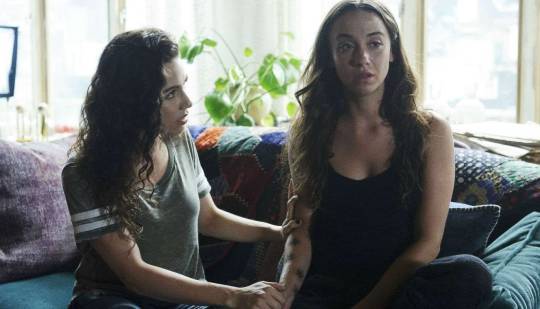
That said, the lessening of The Beast’s presence allows Reynard to be the Big Bad for most of the second season. This gives greater value to Julia’s experience. Also, his comeuppance and Julia’s experience of finally meeting Our Lady of the Underground are more satisfying on the show. I had no idea how much I appreciated that Our Lady restores Julia’s Shade until I found out that she doesn’t do so in the Book. (She just transforms Julia into a Dryad after which Julia disappears for most of the third book.) I was also surprised and a little disappointed to realize that the “Julia was rejected from Breakbill’s because of the timeline experiments on how to best defeat the Beast” is not in the Book. Good job, Show in creating that plot.
(Another Game of Thrones comparison: George R R Martin famously said that one of his goals in his series was to go where fantasy series generally don’t and get into the process of governing. The Magicians books really aren’t interested in that. Ruling Fillory is treated as a whim, even though the decision to collect taxes is one of the events that kickstarts the plot of The Magician King. The show, however, is interested in what it means to run Fillory.)
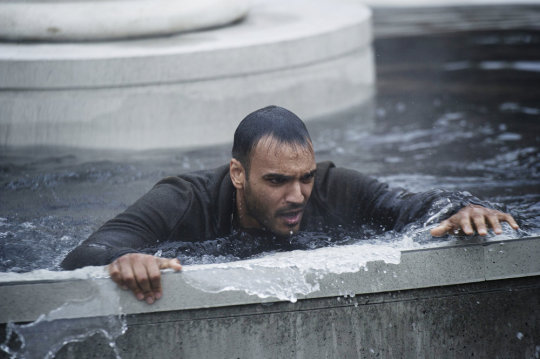
I like the continuous contact with characters that the medium of TV demands. I like that we see Penny joining The Order of Librarians, rather than having him disappear for hundreds of pages and then showing up as a member of The Order.
In general, the books are more sympathetically sensual and the TV show replaces the sensuality with crassness. That may sound more critical of the show than I intend. I really like the show and think it improves upon some aspects of the plot significantly. (For example I’m much more invested in Julia and Free Trade Beowulf’s quest to meet our Lady of the Underground and in it’s tragic aftermath in the TV Show than the Books. In fact, I’m kind of annoyed that it’s mostly a B-plot in the Books when the TV show gives it the time and weight it deserves.) I think the best illustration of this difference would be the wealth of details the book provides in exploring how it feels to be transformed into a different animal. The characters on the show are much more preoccupied by their bodily functions than in the books. Think how much of the second season’s plot was about how the god Ember, defecating in the well that was a source of magic messes things up for everyone. This is what I mean by crass.
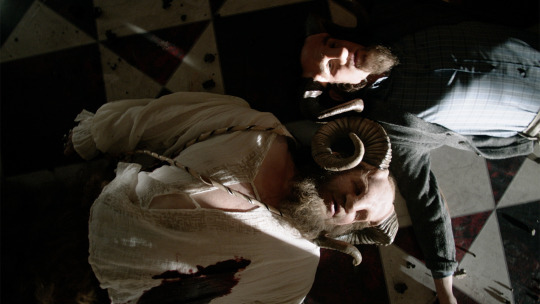
The gods of Fillory, Ember and Umber, are surprisingly different after transitioning from page to screen. Some of the changes are predictable, such as changing their physiques from pure ram to humanoid with ram features. But they also forgo the idea that Umber is Ember’s shadow and they’re really one aspect of the same god in the Book. On TV they’re separate gods one of chaos and one of order. A major themes in The Magician’s Land is the evolution from being a fan to a creator and then letting go of the creation so that new fans can go through that process. Storytelling is a combination of setting rules and creating chaos. Quentin killing Umber happens under very different circumstances and earlier in the narrative in the TV Series. I’m not sure where the letting-go-so-you’re-fans-can-do-their-thing part comes in for the show.
I like that the TV version has musical numbers.
#The Magicians#Lev Grossman#fillory#Narnia#Oz#Ember and Umber#Quentin Coldwater#julia wicker#alice quinn#penny adiyodi#eliot waugh#margo hanson#kady orloff diaz#Martin Chatwin#The Beast#reynard the fox#Our Lady of the Underground#the magician king#the magician's land#Jane Chatwin#Rupert Chatwin#la oreja de van gogh#rene magritte#emily vanderwerff
18 notes
·
View notes
Text
5 Copywriting Tips For Beginners
youtube
Are you a new copywriter that’s just getting into the business or maybe you want to learn copywriting in, you’re not so sure how to get started today I’m going to share with you 5 operating tips, for beginner so if you are a beginner you just, getting started this video, for you, tip number one, and that is desire is much more important than your, degree, don’t be intimidated by the idea of learning how to write, copy I remember when I first, learn about copywriting, i poked myself I was a bit, unsure and I did have lost certainty, could I do this cuz, i didn’t do so well in school I flunk English, twice, when I was, in high school and I don’t have a journalism degree could I actually do this, and what I realize is, that when it comes to copywriting, a lot of things that we learn in school, In medieval in journalism, stew’s don’t apply, those, proper academic writing is very different from copywriting, why academic writing is designed to, educate, right that’s why they kind of, dry to be very boring kind of text, look like, copywriting, it’s a form of writing that is designed to sell, to convert, a a prospect into a customer, a very much a street smart condom, skill not so much, school smart, why you think about school smart it, you know Accounting in engineering and all these excuses, versus cooperating it’s much more Street Smart, over all these years I’ve had maybe maybe, one or two clients and Prospects asking me hey do you have any degree in, writing do you have a degree in journalism, they do not care what daycare is, can your, writing, produce, results, cooperating tip number 2 and Daddy’s Nasser, short form coffee before you, Burn long-form copy know what I mean by that, so when it comes to copywriting, there’s so many different types of cockroaches, long-form am referring to a TV along landing page, right to be, like 5 10 pages, crafting a webinar, crafting a, direct mail piece if you’re doing any kind of dragon, that’s, that’s okay but it takes years to learn, and home you craft, i always suggest to my carpeting students when did you, looney when it just getting started, london short form copy, i’m talking about it could be an email, right it could be an autoresponder sequence, in an e-mail it could be a social media post, equipment Instagram, it could be a short-form Facebook app even Google ads with just a headline, in a few lines write your learning, how people respond, you’re busy crafting, short paragraph on Headline, once you get, feedback and you get data in this sense of, Hey this was what but that wouldn’t work.
Daniel holding a skip, and also it feels your confidence, right. Sometimes when you write a long page, you it’s like 10 20 pages, it is so intimidating, he might take you, three weeks to craft something versus if you got something short, a short email he might just take you 30 minutes if you’re good, an hour, and you can test it you can send it to a client, the eye thing is much, easy way, to get again, operating temp number 3 and Daddy’s spent 80, percent of your time, doing research, and only 20% of the time, writing now one of them is sticks I see a lot of, beginner corporate is make is thinking outside if they can wait to go to the laptop or you got a pan and you, grab the legal pad and they start writing, That’s not what you want to do, you want to spend a majority of the time, researching about your prospects, getting to know, what what are the frustrations what are the pinpoint one of their gold, where do they want to get you once you, know a lot about your prospects, you much, easier you have much easier time crafting a message, death speaks, directly to them something that they would resonate, versus you rush into it you just want to write, if you do your job right, if you do your research right, when you actually, write that coffee it is so much easier and so much, faster, so spend a lot of time thinking about it, just researching about it, right just think it through, single thing about the hooks thing about the pain points think about the messages, before you want a single, operating temp number for and that is right the way, You talk, see that’s why having that, the green alien, and getting that formal education is, actually not that important because, when it comes to copy it Isabel, communicating, you connecting, in communicating with, your customer or your prospect on your reader, so you want to write in very simple language, so I’ll give example, sometimes you might use what I caught one sentence, paragraph, which in English is not very proper sometimes I when I ride I even use, one, word, paragraph, so imagine if I’m actually talking lady, 1 Word paragraph, . and then I will stop the next paragraph, i get this is very unconventional but when it comes to copy it worked, why work because it’s easy, 2 Reasons Why don’t like the way you talk, you want your prospect when they are reading your message, they can almost, here, you talking to them, They can hear your voice, right versus when you read something you like, man this is like, i can’t even, you’re losing me I am confused so this is, so difficult to understand, riker sometimes I think academic writer, you know how it is, they try to write something to, to make themselves sound smart, but it’s not very easily understandable by, the audience, so you don’t want it right away, that you talked also when you’re writing, think of you are writing to one person versus, writing to a group of, okay so instead of using a lot of, you know we, or using a lot of hours use a lot of, you, raise a one-to-one communication, i love you a lot of I, it’s me, sitting across the table I’m just communicating I’m, talking to you versus, i will company is Bubba block that’s not very personal, The more personal it is the most powerful the most.
Compelling, your copy is, arete UA, a short paragraph you and you just pay attention to it, writing right, professional communication, help meet the challenges, i’ll 2 days, digital world, where communication is more important than ever, bC its, billy Woody is very, blake, what, so he’s the way I would, express exactly the same thing, locate me in 3 words, coffee, equals, money, coffee, equals, money, you see a difference, cooperative number 5 and that is tooting your own, swipe, files, now what I mean by that, things of yours, will swipe files they are your, cooperating, okay so as a beginner because you don’t have a lot of experience why you want to do you want to study other people, work, you want to look at Oculus email and other people’s landing pages, anna peoples, letters and mocking messages in, catalogs and everything that they do full page ad because when you study other people’s work, You, stop picking up pads, so when you need to write something that last thing you want to do is you, donate computer and you’re staring at a blank, screen, and try to come up, stuff that’s very very difficult to do that’s not what professionals do, professional copywriters, they have this Archive of, swipe file they would refer to hit you know what I need to write a campaign for, a, supplement product, okay, instead of trying to, volume is think it’s going to be I think I’ll sell it this way this will be the offer know they would go back and say home okay, in the last 5 years 10 years, what are some of the ads what are some of the proven offers, selling, similar product right, maybe in a supplement, that I can look., He’s a hawk, that works, he’s an angle that work, who the headline that works, what they do is they look at all of that, okay I think I could come up with something that’s, similar, right or maybe I can change the angle a little bit depends on what you’re selling, and then there you go, so it’s not about creativity for the, sikacrete empty I want to come up with, something that no one’s ever, ever came up with that is stupid, okay you don’t want to do that, because when you go to the bank, when you deposit your, cooperating check, write someone hires you to write the write the copy, no one is going to, is this your original idea here, right to tell us you’re not going to ask you that, nutella just want to know why how much, is deposit dividend don’t care they do not care, Does not look for activities and is they don’t don’t care, how long, he told me to write this, this piece of crap, they do not give you less money if you say or talk to you like a long month and you have no idea, ice was sitting in front of my computer and it, spending hours on it or you know what I spend one day on it that’s it, they don’t give you more money for spending less, left for spending more time to give you less money has it been last time, it doesn’t matter so, bee smart building up your, wife while I have a massive, massive, why file in my library I mean, like, thousands and thousands, sUV idea, you know those three ring binders like those three binders with like, this thick, i’ve got Polly, 60 mg of Dos, In my life.
That I collected over the years, i could easily, think of a Veneta campaign hey he’s a campaign from x monoma x x number of years ago that’s produced, $5000000, right there, i would know, what if I’m The Proven campaigns and, and winning piece, that I could get ideas and, build your own, swipe file, you see one of the things that people don’t understand is there are many aspects, to cooperating, and copywriter, amounts of the highest, paid, professionals, the world I call them high, income Cocker, if you want to learn how to become a, high-income copywriter you want to know, the different aspects of of copulating and which one you should, pursue your path in, and what types of coffees, should focus on, clinton below and check on life, free on-demand training, on exactly, how, do that so go ahead, clearlink,
from WordPress https://top1course.com/5-copywriting-tips-for-beginners/
0 notes
Text
RIFF 2018: Phoenix, Styx
Iceland’s first art house cinema, Bíó Paradís (Cinema Paradise), is the cozy central venue of the Reykjavík International Film Festival. Upon opening for business in 2010, the theater has screened the latest independent productions from Europe and the U.S. as well as Icelandic narratives, documentaries and shorts. Covering one of the lobby walls is an eye-popping assortment of custom-made posters for each classic movie screened at the theater’s Svartir Sunnudagar (Black Sunday) retrospectives. The witty designs of these posters, some of which can be viewed here, resemble Criterion covers produced by Mad Magazine. I especially loved the mash-up of “Star Wars” and “The Night of the Hunter,” pasting the faces of Lillian Gish and Robert Mitchum onto Princess Leia and Luke Skywalker, respectively. Gish’s immortal line, “It’s a hard world for little things,” certainly applies to one of the most haunting pictures at RIFF 2018, Norwegian writer/director Camilla Strøm Henriksen’s debut feature, “Phoenix.” Newcomer Ylva Bjørkaas Thedin delivers a deeply moving performance as Jill, a girl on the cusp of celebrating her 14th birthday, who has taken on the role of her family’s sole parental figure.
Like Ola, the astoundingly mature child single-handedly keeping her family afloat in Anna Zamecka’s great Polish documentary, “Communion,” Jill must perform all the duties normally reserved for adults, serving as the primary caregiver for both her younger brother, Bo (Casper Falck-Løvås), and her unstable mother, Astrid (Maria Bonnevie). The film’s superbly claustrophobic first half takes place within the shadowy confines of the family’s apartment, as Jill goes about her daily routine of coaxing Astrid out of bed, encouraging her to embrace a new job opportunity, reprimanding her for staying out late drinking and finally wrestling her to the ground after she endures another meltdown. It’s no coincidence that Jill happens to be watching “Pan’s Labyrinth” prior to this frightening episode, since her journey is fraught with peril that threatens to unspool into surreal fantasy. Though Astrid’s mental illness is never specified, Bonnevie’s wide eyes convey the desperation of her character as she strains to keep her volatile temper in check. Any given interaction can swiftly derail into chaos, with Astrid only finding temporary solace in crafting artworks, some of which threaten to take on a life of their own. Henriksen is sparing in her use of horror imagery, thus making their inclusion all the eerier, such as when the tendrils of a painting come alive, or when a John Carpenter-esque creature scuttles across the floor. Spawning each of these nightmares is the young protagonists’ palpable fear of being trapped in a world indifferent to their needs. No matter how much Astrid is loved by her children, she grimly informs them, “You aren’t enough.”
After a galvanizing turn of events, traces of psychosis start to emerge in Jill’s own behavior, as she does everything in her power to protect her brother, who sees through all of his sister’s charades. Eventually their estranged father (Sverrir Gudnason) enters the picture, providing them with a dreamlike escape made all the more painful by its fleeting nature. Any hope that can be found in this story is personified by Jill herself, who is the phoenix rising from the ashes left by two parents unable to deal with the life they brought into the world. Her fierce self-sufficiency in on par with Jennifer Lawrence’s heroine in “Winter’s Bone,” and Thedin is exceptionally skilled at conveying emotions that her character finds too difficult to articulate, even early on while sitting next to a cute guy in class. An educational movie about rainforests projected onto the screen before them makes it appear as if the pair are being doused with water, externalizing the bracing sensation of Jill’s budding crush. It’s a brief yet potent example of Henriksen’s mastery as a visual storyteller. When Festival Director Hrönn Marinósdóttir founded RIFF with a group of cinema experts in 2004, his main desire was to champion fresh faces in cinema, reserving the annual event’s top prize—the Golden Puffin (shaped after the signature animal of Iceland)—for films by first or second-time directors. It would be quite fitting to see this year’s Puffin awarded to a most deserving “Phoenix.”
Three of the titles screening at RIFF have been selected as finalists for the Lux Prize, an award presented by the European Parliament to honor films that shed light on the debate regarding integration throughout Europe. The last four recipients of the prize have been among my favorite films of recent years: Paweł Pawlikowski’s “Ida,” Deniz Gamze Ergüven’s “Mustang,” Maren Ade’s “Toni Erdmann” and Amanda Kernell’s lesser-known yet equally essential Swedish drama, “Sami Blood.” A worthy addition to this list would be the German-Austrian coproduction among the 2018 contenders, Wolfgang Fischer’s riveting thriller at sea, “Styx.” Named after the river in Greek mythology that runs between Earth and the Underworld, this film brilliantly portrays the moral decision facing us all in light of the ever-escalating refugee crisis. Environmental catastrophe spurred in no small part by America’s stubborn reliance on fossil fuels has caused various parts of the world to become increasingly uninhabitable, forcing those who live there to seek a new home, only to be confronted with one border wall after another. Are we to let these souls in need drown as a result of xenophobic protocol or should we lend a hand? That is the question a paramedic, Rieke (Susanne Wolff), must answer while aboard her small sailing boat in the middle of the ocean. Initially the film appears to be little more than another “woman in peril” spectacle, with Rieke battling driving rain and gale-force winds, yet this sequence is simply meant to further illustrate her expertise in acting quickly and effectively amidst daunting circumstances (a fact we see earlier as she tends to the innocent victim of a car accident).
The desired destination of her ocean journey is the artificial forest created by Charles Darwin on Ascension Island, an enduring example of how the seemingly impossible can be achieved with the necessary effort and ingenuity. It was Darwin, of course, who famous noted, “It is not the strongest of the species that survives, nor the most intelligent, but the one most responsive to change.” These words are never spoken in the picture, yet they reverberate through every scene, as Rieke spots a stagnant boat overcrowded with refugees on the imminent horizon. Her urgent “mayday” calls receive terse responses ordering her not to intervene until help arrives, even as people start falling from the boat and drowning. One injured boy, Kingsley (Gedion Oduor Wekesa), manages to swim to Rieke’s boat, and she helps him aboard, carefully lifting his body which falls limp as soon as he reaches safety. Kingsley’s need to rescue the surviving members on his sinking vessel, a group that includes his sister, intensifies the conflict welling up within Rieke. The emotionally charged moment when Kingsley grab her leg reminded me of a similar scene in the Dardenne Brothers’ “The Kid With a Bike,” where an orphaned kids clings to a random woman as if for dear life (both boys stand out all the more courtesy of their red clothing). Not only does Wolff bear a striking resemblance to the previous film’s leading lady, Cécile de France, she also embodies the bold and determined spirit of the classic Dardenne heroine.
In a stunning overhead shot, Fischer surveys a triangle of vessels—Rieke’s sailboat firing distress signals, the nearby ship of dying refugees and an enormous boat perched comfortably in the distant mist, prioritizing job security over recused lives. Whereas Baltasar Kormákur fantastic survival drama, “Adrift,” screening at RIFF as part of a retrospective honoring jury head Shailene Woodley, is a triumph of special effects technology, Fischer went out of his way to shoot “Styx” practically, going so far as to having the crew remain below deck (half of them apparently got seasick). During a post-screening Q&A with the director, an audience member voiced her despair at how people often need works of fiction like “Styx” in order to empathize with the suffering of real people. Yet therein lies the profound purpose of cinema. No art form is more adept at lending a human face to emergencies frequently reduced to statistics on the 24-hour news cycle.
from All Content https://ift.tt/2Ix4avj
0 notes
Text
Once Upon A Time
I’d like to have a little ramble and shout into the void about a truly unique, life affirming and heartfelt movie. Not because any of this hasn’t been covered before - I’d bet my guitar case full of coins it has. Not as a review or a hot take or a think piece, though perhaps it’s a little of all of those things. But because I recently rewatched the 2007 musical drama Once (dir: John Carney) and it reminded me how much this movie makes me fucking feel… which is also the hardest thing for me to eloquently put down into words but hey, I’ll try.
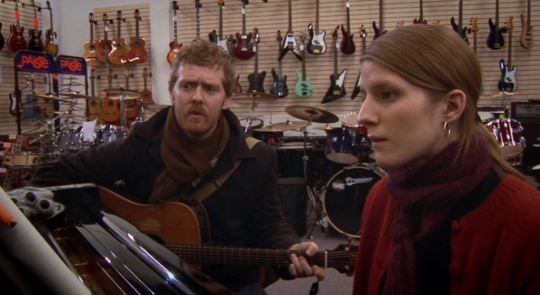
Once tells the simple story of Guy (Glen Hansard), a busker in Dublin who lives with his Dad and works in his hoover repair shop. He’s a talented musician but is still living in the shadow of a long since broken relationship, something that evidently both haunts and drives him. This inner conflict has inevitably kept him stranded in the same place – possessing the skills and the ambition to transform his passion into a career but lacking the courage and the heart to truly see it through. That is until he meets Girl (Markéta Irglová), a Czech immigrant who gets by selling flowers and the Big Issue. She’s a keen pianist and the unlikely pair quickly form a unique friendship, bonding over songwriting, heartbreak and Dublin itself.
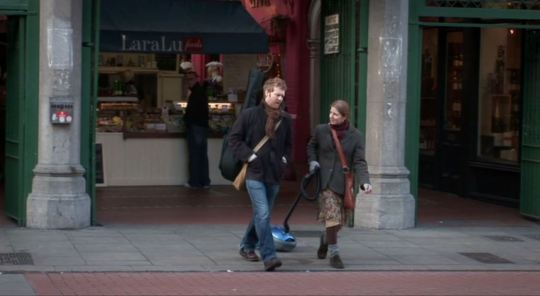
Shot for next to nothing in three weeks, it’s a film so raw (and perfectly suited to that style) that just a single step in either direction would shatter the illusion. Too glossy and the magic is somehow lost. Any more ramshackle and there probably wouldn’t be a finished film to even worry about. Cillian Murphy was supposed to play Guy but dropped out, making way for director John Carney to convince Hansard, who was already set to write the music, to take the natural next step and just play the role himself.
It’s a story that manages to exist in the moment like nothing else I’ve really seen, thanks in part to the guerrilla style production but also thanks to its immense, bittersweet heart and commitment to bottling the ‘life as it happens’ feeling. It’s how we all experience life after all and it’s only afterwards that we may look back on certain memories as feeling like scenes from a movie: those perfectly captured instances where decisions have huge consequences and it feels like some higher power is writing you into a cruel plot twist or inevitable turning point. Its one thing to physically make a movie feel so grounded but to write and perform it that way too shows a real understanding of the tone they were aiming for – and absolutely nailing in the process.
It’s a joyful movie but an effortlessly melancholy one too. Like I said, it’s bittersweet. Anyone who has ever had a dream, ever been in love or ever wished for something more, you can understand and feel all of that through one look at Hansard’s exhausted face. Avoiding saccharine movie tropes and clichés, he’s simply a bloke who rides the bus with his guitar. Who chases thieves stealing his busking money. Who exists in our world. We probably see him every day, out on the streets or hunkered away in a corner of the tube. His or her music echoing through crowds, ignored by most but probably connecting to more people than we might think.

Guy never seems more vulnerable than when he’s hiding behind a forced smile or his sad, puppy dog eyes and watching this mask of happiness slowly blossom into something genuine is where the film really hits me. It reminds us that we have to seek change – or allow change to happen to us – to move from where we are to where we want to be.
I love how Guy is a thirty something pessimist whilst Girl, despite living with just as much of an uncertain, unstable future as Guy, is a ray of sunshine in comparison. She’s a stubbornly joyful extrovert, happily striking up conversations with strangers - a comically recurring trait that rewards her with casual piano practice in the music shop, helps to secure a bank loan for the recording session AND score a reduced charge for the studio hire later on. It’s the ‘if you don’t ask, you won’t get’ mentality, utilised by someone with no ulterior motives; a real pure soul who finds happiness in what she has, not what she’s lacking.
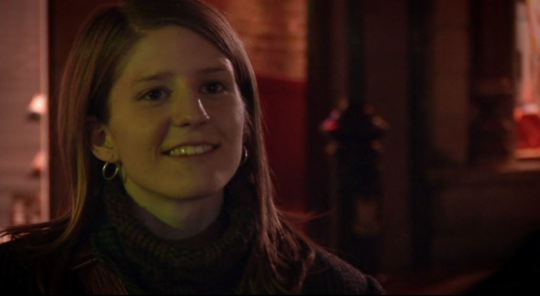
She speaks her mind, unconcerned with any risk of social awkwardness. Her abrupt “I have to go now” way of announcing she’s leaving becomes something of a catchphrase and it works wonderfully in establishing not just the generational difference between the two characters but the cultural one as well. I really love how we first meet her in the film – when she is drawn to Guy performing his most emotionally raw song (the amazing ‘Say it to Me Now’) all alone, in the middle of the night. This exorcism of his repressed feelings, expressed only through his music, is in fierce contrast to Girl’s happy go lucky outlook and she wastes no time in probing him for the truth.
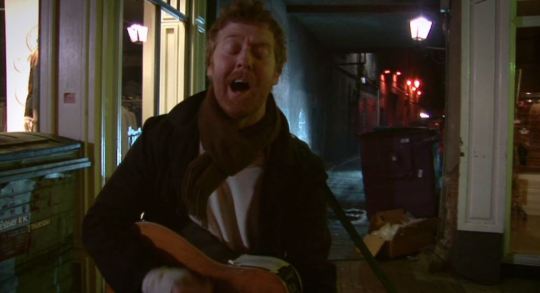
This film is one of the most genius, underplayed and natural musicals ever – essentially doing the ‘bursting into song’ thing whilst remaining firmly in reality, never quite breaking that thinly veiled fourth wall that all other musicals do. Here, it’s in a beautifully captured song-writing-on-the-fly sequence (‘Falling Slowly’) or a late night jam session between family and acquaintances (‘Gold’) or in a great sequence where Girl sings lyrics to an instrumental track given to her by Guy whilst on a walk back from the corner store to buy batteries (’If You Want Me’). It’s so relatable; from the street kids watching her go past to her fluffy slippers to the clunky portable CD player in her hand. Who hasn’t done something like that? A more traditional musical might have been tempted to convert the pedestrians to background singers, cooing harmonies over her shoulder or snapping their fingers in a dance routine through the street but this film shows that life can be full of ‘movie-adjacent’ moments and not feel cheaply earnt whilst portraying them.

This movie is something of an Irish, folksy Before Sunrise – except Guy is probably in the period of his life where he’s actually living in Before Sunset (jaded, wondering what could have been) whilst Girl is firmly in Sunrise (open to new connections, optimistic about the present). They’re on different paths and perhaps even swap roles throughout, with Guy becoming more enlightened and eager for new experiences whilst we learn that Girl is caring for a small child who is product of her past. These two never really come to any real conflict themselves. The closest they maybe get is when Guy makes an awkward, kinda sad pass at her one night – but it’s practically all forgiven and forgotten by the next day. That’s real life too and I’m glad a moment like that is addressed in the story but promptly resolved. It doesn’t need to be this instance of overly contrived setup/payoff, it’s just a misunderstanding that the characters are aware enough to acknowledge and put aside. In fact, so much of this narrative goes against the grain. Guy never gets ‘the Girl’. He chooses to chase down a woman who is probably bad for him. And Girl ends up giving her husband another shot – a character we’ve never met and have barely heard about. Again, just because we aren’t aware of a person’s backstory doesn’t mean it doesn’t exist or that we’re responsible for making any grand change to the way things pan out. Here, a kind gesture of purchasing a piano for a kindred spirit is more than enough… if a little unpractical.

So much of this movie acts as a mirror to the lives of the people making it. The struggling artist narrative is straight out of Hansard’s life, even recording the demo tape in the same studio as he once did. The ex-girlfriend who moved to London is right out of Carney’s own past. All of this helps blur the line between fact and fiction, The scene where Girl tells Guy that she loves him, unprompted and ingeniously unsubtitled, is perhaps the most quietly powerful moment in the film – because the line between performance and truth is shattered as we, like Guy AND Hansard, perhaps can’t tell who’s saying what anymore – the character or the actor. In reality, it may have been both. And it’s captured right there on screen. Lightning in a bottle.
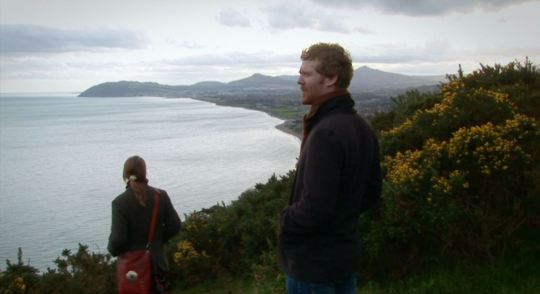
Arguably, this film is set in the last era of when a story like this could be romantic – or at least romanticised. If it was made today, in 2018, Guy would be recording in his bedroom, uploading to Soundcloud, plugging his Patreon page and filling a Youtube account with cover songs sang directly to his webcam. There’s no doubt that the advancements in technology has added an artifice to the whole struggling artist thing and it means something very different in this day and age. Here, in the far flung days of the mid 00s, there’s no real social media presence (Myspace was sort of at its peak but was more of a Facebook precursor than the platform for music it slowly morphed into) and Guy ends the movie with a handful of CDs to show for his time in the studio. Ah physical media, how I miss thee… sometimes…
This is definitely one of those movies that is firmly lodged in my brain. Despite only having watched it twice, three times at most, I’ve had the soundtrack on rotation for ten years and the time I caught Glen Hansard himself in concert (at the Shepherd’s Bush Empire in 2015, natch) was legitimately one of the most memorable gig experiences I’ve ever been to. Everything from the setlist to the showmanship to the intimacy to the grandeur, it was just incredible. An unplugged encore starting with Say It To Me Now up on a balcony in the crowd through to Falling Slowly on piano? Woop woop!

But I digress… this is a film that is firmly time-stamped in my memory. I watched it on the very same night that I first properly met someone who ended up becoming a huge part of my life. Nearly ten years ago to the day, me and some friends - energised by both the movie and the hazy summer evening - trekked across town to a housewarming party. This was a decision which would inevitably change the very direction of my life, which is insane when you really sit down and think about it… and being able to pinpoint the origin of such a huge personal crossroads is kinda what Once is all about so it really does resonate.
And I think this rewatch really did resonate, because I now saw myself more as the cynical, pessimistic person Guy is at the start of the film – just trying to keep on keeping on and push himself out of his comfort zone. To achieve something special or worthwhile. Without getting too personal, I can be my own worst enemy and while 2008 mostly feels more like a lifetime ago, there are times when it feels like it was just yesterday and I blinked and went from then to now in a flash. And we all have these moments. Be it meeting someone influential, deciding to move house, to travel to a new country, to quit that job and take that risk; they can be scary or freeing or even traumatic but they’re an element of life that movies strive to replicate… and this one just does so by downplaying the weight of these moments rather than draw attention to them in an artificial manner.
John Carney has said that the title of the film is in reference to other talented musicians and artists that he knew, who always said ‘once I do this and once I do that, then I’ll pursue my passion’ etc, referring to the realities (and the safety nets) of life that can sometimes stop people from taking the plunge and chasing their dreams. I’ve definitely felt the same way and have constantly had that conversation inside my own head: that once I get these things sorted then these things lined up then I’ll do such and such and how in the end, time just keeps on moving regardless… so you have to act.
This film is about making that choice to act.

0 notes